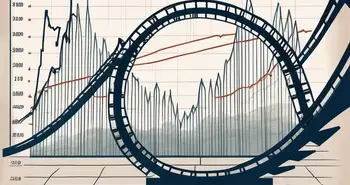Exploring the Difference Between Cyclical and Non-Cyclical Stocks

Understanding the Basics of Stocks
Before we dive into the difference between cyclical and non-cyclical stocks, let's first understand the basics of stocks. In the world of finance, a stock represents a share in the ownership of a company. When you own a stock, you become a shareholder, which means you have a claim on the company's assets and earnings.
Stocks are typically bought and sold on stock exchanges, such as the New York Stock Exchange (NYSE) or the Nasdaq. As an investor, you can buy and sell stocks to potentially earn a profit by capitalizing on price fluctuations. It's essential to note that investing in stocks comes with risks, and thorough research and analysis are crucial before making any investment decisions.
Defining Cyclical Stocks
Cyclical stocks are a specific category of stocks that tend to be highly influenced by the overall economic conditions. These stocks are known for their sensitivity to business cycles, which means that their performances are closely tied to the ups and downs of the economy. As a result, their prices tend to fluctuate more during economic expansions and contractions.
Cyclical stocks are typically found in industries such as construction, automotive, manufacturing, and travel. These sectors are directly impacted by changes in consumer spending habits and economic growth. When the economy is thriving, cyclical stocks tend to perform well as consumer demand increases. However, during economic downturns, these stocks may face challenges as demand decreases.
Understanding Non-Cyclical Stocks
In contrast to cyclical stocks, non-cyclical stocks, also referred to as defensive stocks, are associated with companies that provide products or services that are in demand regardless of the economic climate. These stocks are known for their stability and ability to weather economic uncertainties.
Sectors dominated by non-cyclical stocks include healthcare, utilities, consumer staples, and essential services. Companies in these sectors offer products and services that are necessities for people, regardless of the state of the economy. For example, healthcare companies provide essential medical services, while utility companies supply electricity and water, which are indispensable to our daily lives.
Key Differences Between Cyclical and Non-Cyclical Stocks
Now that we understand the basic concepts of cyclical and non-cyclical stocks, let's explore the key differences between them.
Performance During Economic Fluctuations
One significant difference between cyclical and non-cyclical stocks lies in their performance during economic fluctuations. Cyclical stocks tend to experience greater volatility during economic downturns, as their business operations and revenues can be heavily impacted by reduced consumer spending.
On the other hand, non-cyclical stocks have historically shown more resilience during economic downturns. As these stocks are associated with companies providing essential products or services, their demand remains relatively stable. This stability often results in a more consistent performance regardless of the state of the economy.
Risk and Return Comparison
Risk and return are critical factors to consider when investing in stocks. Cyclical stocks generally offer higher potential returns during economic expansions, especially if you time your investments correctly. However, they also carry a higher level of risk due to their sensitivity to economic conditions.
Non-cyclical stocks, while potentially offering more modest returns during economic booms, come with a lower level of risk. Their stability and consistent demand make them attractive options for investors seeking a more defensive approach.
Strategies for Investing in Cyclical and Non-Cyclical Stocks
Investing in both cyclical and non-cyclical stocks can be a part of a well-diversified portfolio strategy. Here are some strategies to consider:
Timing the Market with Cyclical Stocks
For investors looking to capitalize on economic cycles, timing the market becomes crucial when investing in cyclical stocks. You'll want to buy when the economy is on an upswing, and demand for cyclical products and services is high. Similarly, selling or reducing exposure to cyclical stocks during economic downturns can help protect your portfolio from excessive losses.
Of course, attempting to time the market can be challenging, and it's important to carefully analyze the overall economic conditions and industry trends before making investment decisions.
Long-Term Stability with Non-Cyclical Stocks
Investors seeking long-term stability and more predictable returns may find non-cyclical stocks appealing. These stocks can act as a hedge against economic uncertainties, providing a buffer during downturns and helping to reduce overall portfolio risk.
When investing in non-cyclical stocks, look for companies with solid fundamentals, a history of consistent performance, and a competitive advantage in their respective markets. Conducting thorough research and staying updated on industry trends will help you make informed investment choices.
By diversifying your portfolio with both cyclical and non-cyclical stocks, you can potentially benefit from the growth opportunities offered by cyclical stocks during economic expansions, while maintaining stability and minimizing risk with non-cyclical stocks.
Personal Advice:
As an expert in the field of stocks, I have come across many investors who become overly focused on either cyclical or non-cyclical stocks. While both categories have their unique characteristics, it's essential not to overlook the benefits of diversification.
Throughout my years of experience, I've witnessed investors achieving greater success and mitigating risks by having a well-balanced portfolio that includes a mix of both cyclical and non-cyclical stocks. This approach allows for potential growth during economic expansions while providing stability during economic downturns.
Remember to always conduct thorough research, stay informed, and consult with a financial advisor before making any investment decisions.
FAQ
What are cyclical stocks?
Cyclical stocks are stocks that tend to be highly influenced by the overall economic conditions. Their performances are closely tied to economic cycles, resulting in price fluctuations based on the state of the economy.
What are non-cyclical stocks?
Non-cyclical stocks, also known as defensive stocks, are stocks associated with companies whose products or services remain in demand regardless of the economic climate. These stocks offer stability and potential resilience during economic downturns.
How do cyclical and non-cyclical stocks differ in terms of performance during economic fluctuations?
Cyclical stocks tend to experience more significant volatility during economic downturns due to their sensitivity to reduced consumer spending. Non-cyclical stocks, on the other hand, have historically shown more resilience and stability during economic downturns due to their association with essential products or services.
What are some strategies for investing in cyclical and non-cyclical stocks?
One strategy is to time the market with cyclical stocks, buying during economic upswings and selling during downturns. For non-cyclical stocks, focus on identifying companies with solid fundamentals and a history of consistent performance. By diversifying your portfolio with both categories, you can potentially benefit from growth opportunities while maintaining stability.
What is the importance of diversification in a stock portfolio?
Diversification helps mitigate risk by spreading investments across different stocks, sectors, or asset classes. By diversifying your stock portfolio, you reduce the impact of any single investment's performance and increase the likelihood of achieving more stable and consistent returns.
Now that you understand the nuances between cyclical and non-cyclical stocks, it's time to put that knowledge into action. With Morpher, you can effortlessly diversify your portfolio across various asset classes, including both types of stocks, cryptocurrencies, and more. Experience the future of trading with zero fees, infinite liquidity, and the flexibility of fractional investing. Sign up today to take advantage of Morpher's innovative platform and receive your free sign-up bonus. Embrace the power of blockchain and elevate your investment strategy now. Sign Up and Get Your Free Sign Up Bonus.

Disclaimer: All investments involve risk, and the past performance of a security, industry, sector, market, financial product, trading strategy, or individual’s trading does not guarantee future results or returns. Investors are fully responsible for any investment decisions they make. Such decisions should be based solely on an evaluation of their financial circumstances, investment objectives, risk tolerance, and liquidity needs. This post does not constitute investment advice.

Painless trading for everyone
Hundreds of markets all in one place - Apple, Bitcoin, Gold, Watches, NFTs, Sneakers and so much more.

Painless trading for everyone
Hundreds of markets all in one place - Apple, Bitcoin, Gold, Watches, NFTs, Sneakers and so much more.









